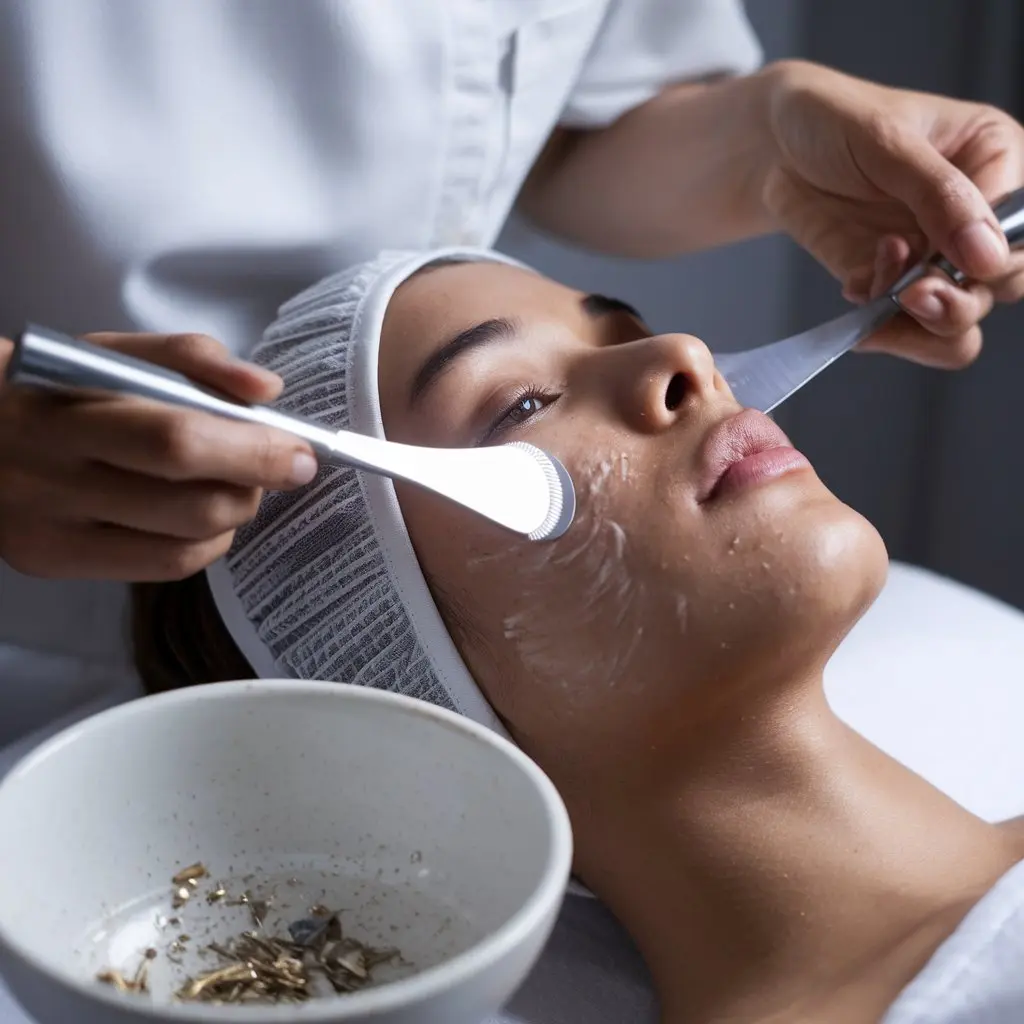Skin extractions are a common procedure in professional facials. Estheticians perform extractions to remove blackheads, whiteheads, and clogged pores. Before this process, it’s crucial to soften the debris lodged deep within the pores. This is where an exfoliant becomes essential. The right exfoliant helps loosen the build-up and prepare the skin for a smoother, less painful extraction. But, which exfoliant should you use to soften debris before extractions? Let’s explore.
Why Exfoliation Is Important Before Extractions
Exfoliation is the process of removing dead skin cells from the surface of your skin. It prevents clogged pores, reduces acne, and helps skincare products penetrate deeper. Before extractions, exfoliating is essential. It softens the sebum (oil), dead cells, and other debris in your pores, making the extraction process easier and more effective.
Using the right exfoliant softens the hardened debris and helps it loosen from the pore walls. This reduces the risk of irritation or damage during extractions. Proper exfoliation can also shorten the extraction process and minimize discomfort.
Types of Exfoliants
There are two main types of exfoliants: physical and chemical.
1. Physical Exfoliants
Physical exfoliants contain small particles or granules that physically scrub away dead skin cells. These can include scrubs with sugar, salt, or crushed fruit seeds. While they offer immediate smoothness, physical exfoliants can be harsh on the skin, especially before extractions. They may cause micro-tears and irritation, making the extraction process more uncomfortable.
Examples of physical exfoliants include:
- Sugar scrubs
- Coffee scrubs
- Walnut shell scrubs
- Microdermabrasion tools
While effective for some skin types, physical exfoliants are generally not the best choice before extractions. They might aggravate the skin, leaving it more sensitive.
2. Chemical Exfoliants
Chemical exfoliants work by dissolving the bonds between dead skin cells, allowing them to shed naturally. These exfoliants penetrate the skin to loosen debris from deep within the pores. They are often more suitable for sensitive skin and are highly effective in softening debris before extractions.
There are two types of chemical exfoliants: alpha hydroxy acids (AHAs) and beta hydroxy acids (BHAs).
- AHAs: These are water-soluble acids that work on the skin’s surface. They are ideal for dry or sun-damaged skin. Common AHAs include glycolic acid, lactic acid, and citric acid. AHAs are effective at loosening dead skin cells, but they may not penetrate deeply enough to soften debris in oily or acne-prone skin.
- BHAs: These are oil-soluble acids, which means they can penetrate the skin’s surface and reach deeper into the pores. The most common BHA is salicylic acid. BHAs are excellent for oily, acne-prone skin because they exfoliate inside the pores, breaking down sebum and debris.
Which Exfoliant Softens Debris Best Before Extractions?
While both physical and chemical exfoliants have their benefits, BHAs, specifically salicylic acid, are the best choice for softening debris before extractions. Here’s why:
- Penetrates Deep into Pores: Salicylic acid dissolves excess sebum, dead skin cells, and other debris trapped inside the pores. It reaches deep within the skin, where it effectively softens hardened debris.
- Reduces Inflammation: Salicylic acid has anti-inflammatory properties, which can help calm the skin and reduce redness. This is crucial before extractions to prevent irritation.
- Prevents Acne: Salicylic acid also prevents future breakouts by keeping pores clear after the extraction process. It not only softens debris for removal but also helps keep the pores clean long-term.
- Gentle on the Skin: Compared to physical exfoliants, salicylic acid is less abrasive and doesn’t cause micro-tears or irritation. It preps the skin for extractions without making it sensitive or inflamed.
Why Not Use Physical Exfoliants?
Physical exfoliants, while effective in sloughing off dead skin cells on the surface, do not penetrate deeply into the pores. They are also harsher on the skin and can cause tiny abrasions. When used before extractions, they can make the skin more prone to irritation or even infection. Chemical exfoliants like salicylic acid are gentler and more effective in softening debris before extractions.
How to Use a BHA Exfoliant Before Extractions
Now that we know salicylic acid is the best exfoliant for pre-extraction softening, let’s discuss how to use it effectively.
1. Cleanse Your Skin
Start with a gentle cleanser to remove dirt, oil, and makeup from your skin. Cleansing helps the exfoliant penetrate better and ensures your skin is ready for the next step.
2. Apply Salicylic Acid
After cleansing, apply a salicylic acid-based product to your skin. This can be in the form of a toner, serum, or gel. Make sure the product is designed for your skin type (for example, oil-free formulations for oily skin).
Gently apply it to the areas where you plan to perform extractions. Salicylic acid will start breaking down the oils and debris inside your pores.
3. Wait for It to Work
Salicylic acid needs time to work. Wait about 5-10 minutes for the product to absorb into your skin and soften the debris. You might feel a slight tingling sensation, which is normal.
4. Proceed with Extractions
Once your skin has softened, you can begin the extraction process. Use gentle pressure to avoid damaging your skin. If you’re unsure, it’s best to consult a professional esthetician who can safely perform extractions.
Best Products Containing Salicylic Acid for Pre-Extraction Softening
If you’re looking for some salicylic acid products to soften debris before extractions, here are some top-rated options:
1. Paula’s Choice Skin Perfecting 2% BHA Liquid Exfoliant
This product is a cult favorite. It contains 2% salicylic acid and works well to soften debris and prevent future breakouts. It’s gentle enough for daily use and leaves your skin smoother after each application.
2. The Ordinary Salicylic Acid 2% Solution
The Ordinary offers affordable yet effective skincare. Their salicylic acid solution is great for targeting oily and acne-prone areas before extractions. It penetrates deeply into the pores to soften sebum and debris.
3. Murad Clarifying Toner
Murad’s Clarifying Toner is another excellent product that contains salicylic acid. It not only softens debris before extractions but also balances oil production, preventing clogged pores.
4. Cosrx BHA Blackhead Power Liquid
This Korean skincare product is well-loved for its effectiveness. It contains salicylic acid along with other skin-soothing ingredients. It exfoliates, softens, and prevents future blackheads.
How Often Should You Use Salicylic Acid?
While salicylic acid is gentle, overuse can dry out your skin. If you have sensitive skin, start by using it 2-3 times a week. For oily or acne-prone skin, you may use it more frequently, up to once a day. Always follow with a hydrating moisturizer to maintain your skin’s balance.
Other Tips to Soften Debris Before Extractions
Along with using a BHA exfoliant like salicylic acid, here are some additional tips to help soften debris before extractions:
1. Steam Your Face
Steam helps open up your pores and softens debris, making extractions easier. After applying your salicylic acid, consider steaming your face for a few minutes. This will further loosen the oil and dead skin cells.
2. Use a Hydrating Mask
After exfoliation, apply a hydrating mask to nourish and soothe your skin. This ensures your skin stays calm and balanced after the extraction process.
3. Be Gentle
Even with the right exfoliant, it’s essential to be gentle during extractions. Pressing too hard can lead to scarring or damage. Always consult an expert if you’re unsure how to perform extractions safely.
Conclusion
When preparing your skin for extractions, using the right exfoliant is crucial. While physical exfoliants might be tempting, chemical exfoliants, especially salicylic acid (BHA), are the best choice. Salicylic acid penetrates deep into your pores, softening debris and preparing the skin for easier, less painful extractions. Whether you’re doing extractions at home or visiting a professional, incorporating a salicylic acid-based exfoliant will ensure better results and healthier skin in the long run.

